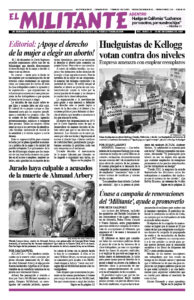As part of ongoing assaults on opposition political forces, Russian President Vladimir Putin is driving to shut down International Memorial, an organization that commemorates victims of repression by the Stalinist regime in the former Soviet Union and exposes attacks on political rights today.
Its database works to preserve the memory of the estimated 20 million people imprisoned in the Gulag, a system of forced labor camps set up after Joseph Stalin usurped political power in the mid-1920s that lasted until after his death in 1953. Its Moscow archives hold 75,000 documents, thousands of books and artwork by prisoners over many years.
Stalin headed a petty-bourgeois bureaucratic caste that carried out a counterrevolution against the policies fought for by Vladimir Lenin, the central leader of the 1917 socialist revolution. Under Lenin, the Bolshevik Party led millions of workers and farmers to overturn capitalist rule and take power.
The revolutionary government nationalized industry under workers control, distributed land to peasants and granted self-determination to nations long oppressed by the former czarist rulers. The Bolsheviks founded the Communist International to build proletarian parties worldwide to emulate that example.
Putin blames Lenin for Russia’s problems today. In 2016, he said the Soviet revolutionary leader “planted an atomic bomb under the building that is called Russia,” pointing to the debate “between Stalin and Lenin regarding the creation of the new state.” Putin says the revolution itself was a disaster for “Mother Russia.”
On Nov. 25, Russia’s Prosecutor General called on the Supreme Court to ban the International Memorial Society, claiming the group failed to comply with government rulings that both it and the Memorial Human Rights Center in Moscow are “foreign agents” and must put that label on anything they publish.
At a Nov. 23 hearing in Moscow’s City Court, prosecutors also accused the Human Rights Center of making statements in support of “terrorists” and “extremists.”
Stalin executes Bolshevik leadership
For the last 15 years, Memorial has organized an annual event in Lubyankya Square near the former KGB headquarters, called the “Returning of Names.” It commemorates some 750,000 executed during the height of Stalin’s purges in 1937-38.
The 1936-37 Moscow show trials paved the way for Stalin to murder the remaining living central leaders of the Russian Revolution. An international commission of inquiry headed by John Dewey, a well-known Columbia University professor, irrefutably disproved frame-up charges against the chief defendant, Bolshevik leader Leon Trotsky. Supporters of Trotsky’s and Lenin’s policies remained politically active in Moscow’s prison camps into the 1960s.
Memorial activists also make the entire archive of the clandestine samizdat journal “The Chronicle of Current Events,” published between 1968 and 1983, available online. Excerpts from its early years are also printed in Samizdat: Voices of Soviet Opposition published by Pathfinder Press.
The organization is also subject to repression because of its defense of opposition politician Aleksei Navalny, who was poisoned by government thugs, and the punk band Pussy Riot, whose members were jailed for their criticism of Putin and speaking out against his regime’s invasion of Crimea in 2014.
Memorial monitors Moscow’s attacks on political rights in Ukraine, Crimea, North Ossetia, Chechnya and Ingushetia. It exposed atrocities perpetrated during the Russian rulers’ two Chechen wars in the mid-1990s and early 2000s.
The attempt to shut down Memorial “is an attack on historical memory [of the Stalinist Gulag], but also on a highly respected organization which has had the courage to speak out, including over Russia’s aggression against Ukraine, its crimes in Chechnya and much more,” Halya Coynash, a member of the Kharkiv Human Rights Protection Group, Memorial’s chapter in Ukraine, told the Militant.
Moscow claims Memorial is “justifying terrorism and extremism,” when it defends political prisoners, she said. “This has a very direct impact for occupied Crimea, and particularly the persecution of Crimean Tatars.” Putin’s forces closed down the Mejlis, the Tatar assembly in Crimea, and jailed opponents of Russian rule on trumped-up terrorism charges.
Memorial was established in the late 1980s. Soviet dissident and physicist Andrei Sakharov served as its first chair until his death in 1989.
Assaults against the organization go back years. Memorial board member Natalya Estemirova was killed in 2009 while working to expose Moscow’s abuses in Chechnya. Two years later board member Oleg Orlov was kidnapped and beaten in Ingushetia. On Oct. 14 Memorial’s Moscow offices were raided while a film about the 1930 famine in Ukraine was being screened. That disaster, which took the lives of millions, was a product of Stalin’s policies of forced collectivization of peasants’ land.
“Liquidating us won’t mean that everything will stop,” Orlov told the BBC. “We’ll work from our apartments until they jail us all.” The trial on the banning of the International Memorial Society resumes Dec. 14.

